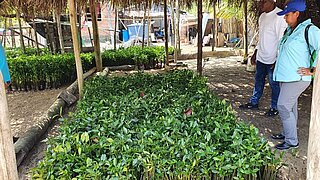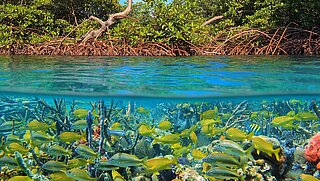Using Caribbean ecosystems to protect against the impacts of climate change

The IKI is supporting the conservation of the Colombian Caribbean coastline.
The Caribbean region of Colombia is heavily populated and one of the country’s most economically dynamic regions. At the same time, with its 2,000 km of coastline, the region is especially exposed to climate change: the increase in extreme weather events and sea level rise are causing erosion and endangering the livelihoods of the region’s rural population.
Mangrove forests protect the coasts
Protecting endangered coastal areas cannot be tackled alone by the comparatively expensive construction of piers and breakwaters. In Colombia, a strategy known as ‘ecosystem-based adaptation’ to climate change is therefore also being applied. This involves the utilisation of natural ecosystems to protect against the impacts of climate change – on endangered coastal areas, in this case.
Forests consisting of native mangrove species are especially suitable (Rhizophora mangle, Avicennia germinans and Conocarpus erectus). Tree nurseries in 25 rural communities have cultivated seedlings from these native mangrove species and used them to restore more than 330 hectares of mangrove forests. For a further 630 ha of mangrove forests, collaborative projects with indigenous Wayu communities in the arid province of Guajira were used to develop participative conservation and management models. This was supplemented by the implementation of measures to restore natural water cycles.

Contribution to the ‘Vida Manglar’ Blue Carbon project
Mangrove forests offer effective protection against erosion for coastlines by reducing wave energy and therefore lessening the risk of flooding for coastal communities as a result of storm surges and sea level rise. In addition, they are also especially effective at capturing CO2 and sequestering carbon in both their biomass and the soil.
With the rehabilitation of 120 hectares, the IKI project has contributed to the first certified and registered Blue Carbon project ‘Vida Manglar’, which has been projected to cut carbon emissions by no less than 1.2 million tonnes over the next 30 years. Mangrove forests also provide breeding grounds for fish and a habitat for shellfish, which can then be caught and used sustainably by the local population.
Environment Ministry and regional environmental authorities identify the best ideas for adaptation to climate change
In a project supervised by the Colombian Ministry for the Environment, the independent regional environmental authorities identified the coastal areas most severely threatened by erosion. The locations of coastal systems most suited to being used for protection against the impacts of climate change were then determined.
As a final step, the project team reviewed the measures that should be prioritised for this shortlist of ecosystems in national, regional or local policy or strategies. As a result of this integrated and participative approach, eleven measures for ecosystem-based adaptation to climate change were implemented in mangrove forests and seagrass beds, and across dunes and beaches.
These measures will contribute to the stabilisation of 175 km of coastline and result in immediate improvements to the living conditions of around 40,000 people.
Monitoring system to support policymaking decisions
Together with INVEMAR, the ocean research institution responsible for the Caribbean region, a system was developed for monitoring coastal erosion and the state of natural coastline ecosystems. Existing ecosystems were also supplemented by newly developed indicators, such as the condition and state of mangrove trees, and made publicly available on the website https://mabe-invemar.hub.arcgis.com/ The monitoring system is intended to provide orientation for key policymakers.
A decentralised and participative approach was also chosen for data collection, which involved both regional environmental authorities and coastal populations. This project was prepared with extensive training and educational programmes.
The link has been copied to the clipboard
Contact
IKI Office
Zukunft – Umwelt – Gesellschaft (ZUG) gGmbH
Stresemannstraße 69-71
10963 Berlin





